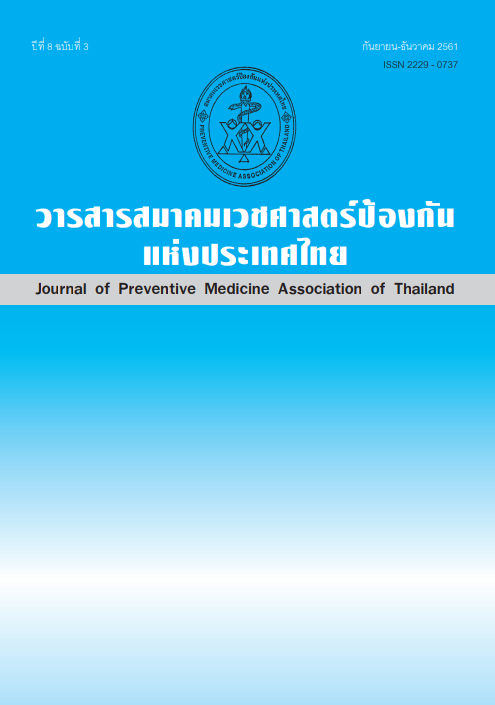การศึกษาปัจจัยที่มีผลต่อการควบคุมระดับน้ำตาลในเลือด ของผู้ป่วยเบาหวานชนิดที่ 2 ที่เข้ารับการรักษา ในสถานีอนามัยเฉลิมพระเกียรติ 60 พรรษา นวมินทราชินี คลองมะสง อำเภอไทรน้อย จังหวัดนนทบุรี
คำสำคัญ:
ผู้ป่วยเบาหวานชนิดที่ 2, ปัจจัยที่มีผล, การควบคุมระดับน้ำตาลในเลือดบทคัดย่อ
การศึกษานี้มีวัตถุประสงค์เพื่อศึกษาปัจจัยที่มีผลต่อการควบคุมระดับน้ำตาลสะสมในเลือดของผู้ป่วยเบาหวานชนิดที่ 2 ที่เข้ารับการรักษาในสถานีอนามัยเฉลิมพระเกียรติ 60 พรรษา นวมินทราชินี คลองมะสง เป็นการวิจัยแบบ Cross Sectional Study ประชากรที่ศึกษาคือผู้ป่วยที่ได้รับการวินิจฉัยว่า เป็นโรคเบาหวานชนิดที่ 2 ที่เข้ารับการรักษาในสถานีอนามัยเฉลิมพระเกียรติ 60 พรรษา นวมินทราชินี คลองมะสง โดยศึกษาในกลุ่มตัวอย่างจำนวน 106 ราย เครื่องมือที่ใช้ในการวิจัย ได้แก่ แบบสอบถามที่ผู้วิจัยสร้างขึ้นจากการทบทวนเอกสารงานวิจัยที่เกี่ยวข้อง ตรวจสอบความตรงของเนื้อหาโดยผู้ทรงคุณวุฒิที่มีความรู้และประสบการณ์รวมจำนวน 3 ท่าน ทดสอบความน่าเชื่อถือพบ Cronbach’s alpha coefficient ได้ค่าความน่าเชื่อถือเท่ากับ 0.718 วิเคราะห์ข้อมูลด้วยโปรแกรมคอมพิวเตอร์สำเร็จรูป โดยวิเคราะห์ข้อมูลด้วยสถิติเชิงพรรณนา, Chi-square test, Independent t-test และ Multiple linear regression
ผลการศึกษาพบว่ารายได้เฉลี่ยครอบครัวต่อเดือน มีความแตกต่างกันระหว่างกลุ่มที่มีระดับ HbA1c สูงกว่าหรือเท่ากับ 6.5% และกลุ่มที่ต่ำกว่า 6.5% อย่างมีนัยสำคัญทางสถิติที่ระดับ 0.05 (p=0.027 และ p<0.001 ตามลำดับ) โดยปัจจัยความรู้เกี่ยวกับโรคเบาหวาน ปัจจัยเจตคติเกี่ยวกับโรคเบาหวาน และการได้รับการสนับสนุนในการดูแลสุขภาพ ไม่มีความแตกต่างกันในทางสถิติระหว่างทั้งสองกลุ่ม (p=0.149,p=0.303 และ p=0.949 ตามลำดับ) และปัจจัยด้านความรู้เกี่ยวกับโรคเบาหวานมีความสัมพันธ์กับการควบคุมระดับน้ำตาลสะสมในเลือดอย่างมีนัยสำคัญทางสถิติที่ระดับ 0.05 (p=0.048) มีค่าสัมประสิทธิ์ถดถอยมาตรฐาน (β) เท่ากับ 0.232 ขณะที่เจตคติเกี่ยวกับโรคเบาหวานและการได้รับการสนับสนุนในการดูแลสุขภาพไม่มีความสัมพันธ์ในทางสถิติ
ดังนั้นจึงควรส่งเสริมให้ความรู้ความเข้าใจเกี่ยวกับโรคเบาหวานมากยิ่งขึ้นในผู้ป่วยและคนในครอบครัวร่วมกัน ทั้งรายใหม่และรายเก่า เพื่อการควบคุมระดับน้ำตาลในเลือดของผู้ป่วย และคนในครอบครัวมีความเข้าใจการดำเนินของโรค และสิ่งที่ผู้ป่วยจะต้องปฏิบัติ
เอกสารอ้างอิง
2. Krejcie RV, Morgan DW. Determining sample size for research activities. Educational and Psychological Measurement 1970;30(3):607-610.
3. Rovinelli RJ, Hambleton RK. On the use of content specialists in the assessment of criterion-referenced test item validity. Dutch Journal of Educational Research 1977;
2:49-60.
4. เกียรติสุดา ศรีสุข. ระเบียบวิธีวิจัย. เชียงใหม่: โรงพิมพ์ครองช่าง; 2552. หน้า 144.
5. Stone DB. A study of the incidence and course of poor control in patient with diabetes mellitus. Am J Med Sci 1961;24:436-444.
6. แอนน์ จิระพงษ์สุวรรณ, ปวีณา แสวงผล. ปัจจัยที่มีความสัมพันธ์กับพฤติกรรมการดูแลตนเองของผู้ป่วยเบาหวาน โรงพยาบาลลาดหลุมแก้ว อำเภอลาดหลุมแก้ว จังหวัดปทุมธานี. วารสารสาธารณสุขและการพัฒนา 2554;9(2):130-142.
7. ทรรศนีย์ สิริวัฒนพรกุล, นงนุช โอบะ, สุชาดา อินทรกำแหง ณ ราชสีมา. ปัจจัยที่มีความสัมพันธ์กับระดับน้ำตาลในเลือดของผู้ป่วยเบาหวานชนิดที่ 2. วารสารพยาบาลศาสตร์ มหาวิทยาลัยนเรศวร 2550;1(2):57-67.
8. สมชาย พรหมจักร. ปัจจัยที่มีผลต่อพฤติกรรมของผู้ป่วยเบาหวานชนิดไม่พึ่งอินสุลิน ในการควบคุมระดับน้ำตาลในเลือด. วารสารวิจัยระบบสาธารณสุข 2550;1(2):10-18.
9. อนุชา คงสมกัน. ปัจจัยที่มีความสัมพันธ์ต่อพฤติกรรมการควบคุมระดับในเลือดของผู้ป่วยเบาหวาน โรงพยาบาลรามาธิบดี. [สาธารณสุขบัณฑิต (ต่อเนื่อง) ภาคพิเศษ] กรุงเทพฯ: มหาวิทยาลัยมหิดล; 2554.
10. อรพิน รังสีสาคร, ศิริพร จันทรคาด, ศาสตรี เสาวคนธ์. ปัจจัยที่ความสัมพันธ์กับศักยภาพด้านพฤติกรรมสุขภาพในการควบคุมระดับน้ำตาลในเลือดของผู้ป่วยเบาหวานชนิดที่ 2 ที่มารับบริการ การตรวจรักษาที่ศูนย์วิทยาศาสตร์สุขภาพ มหาวิทยาลัยบูรพา อำเภอเมือง จังหวัดชลบุรี. ชลบุรี: มหาวิทยาลัยบูรพา; 2552.
11. กุสุมา กังหลี. ปัจจัยที่มีความสัมพันธ์ต่อการควบคุมระดับน้ำตาลในเลือดของผู้เป็นเบาหวานชนิดที่สอง โรงพยาบาลพระมงกุฎเกล้า. วารสารพยาบาลทหารบก 2557;15(3):256-268.
ดาวน์โหลด
เผยแพร่แล้ว
รูปแบบการอ้างอิง
ฉบับ
ประเภทบทความ
สัญญาอนุญาต
บทความที่ลงพิมพ์ในวารสารเวชศาสตร์ป้องกันแห่งประเทศไทย ถือเป็นผลงานวิชาการ งานวิจัย วิเคราะห์ วิจารณ์ ตลอดจนเป็นความเห็นส่วนตัวของผู้นิพนธ์ กองบรรณาธิการไม่จำเป็นต้องเห็นด้วยเสมอไป และผู้นิพนธ์จะต้องรับผิดชอบต่อบทความของตนเอง






